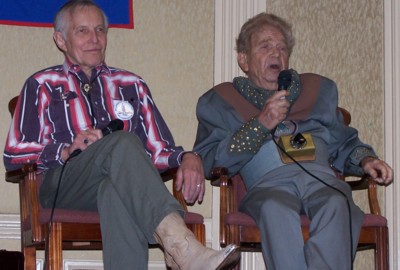1) Early Influences
2) Writing for Another World
3) The novels
When I was a kid, I liked H. P. Lovecraft, writer of stories in Weird Tales magazine, H. Rider Haggard, and Edgar Rice Burroughs. I devoured numerous pulp Sci-Fi magazines. More seriously, I read all the journals of African explorers, which led to fictional books by Stuart Cloete, Alan Paton, and other writers of foreign lands.
One of many characters in my first manuscript, Ainoko, a tragic tale dealing with Occupied Japan, was based upon that country's late gifted author, Yukio Mishima. Another poetic author's book, which I read over and again, is Loren Eisley's The Night Country. Of course, I studied the usual classics during my school years, and got to read War and Peace while serving as a torpedoman in the Navy during WW2 in the South Pacific... an odd choice, but I had not read it before and it was one of few books in our shipboard library I found of interest.
Over all, I generally read almost anything that comes to hand. It would be hard to say which are favorites. In the early Depression era of radio's beginnings and vaudeville's end, books were the major escape for all of us... and the growth of silent films and 'talkies' began taking over rapidly to steal time formerly used for reading. |
Jan Merlin served in the Navy during WWII. After his tour of duty, he decided to try acting, and made both his theatrical and Broadway debut in Mr. Roberts, which starred Henry Fonda. In 1950 he went on to the new medium of television, starring as Roger Manning in Tom Corbett, Space Cadet, opposite Frankie Thomas as Tom Corbett and Al Markhim as Astro.
Not wishing to be typecast in the role, Jan left after three years (with a brief return) and spent the next few decades making a few films and guest-starring in hundreds of television series.
From 1970-1975 he wrote for the soap opera Another World, winning an Emmy for his efforts, and since then he's been writing non-stop.
Read more about Jan's theatrical and television career at: Williamsburg Film Festival 2006 Report
|
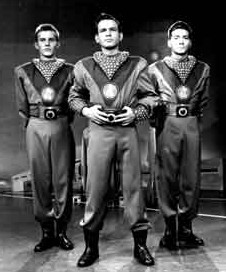
Tom Corbett: Space Cadet
|
Nowadays, it's television which devours our minds. I watch news and current events mainly, and a choice of public station tv presentations, plus old-time movies. Television, which started out being exciting live theater, has become a filmed, laugh-tracked bore. Almost all the regular series of shows presented on our networks and cable seem clones of older ones. I prefer BBC presentations best. British actors are better schooled than ours, and are not plastic replicas of one another.
Of our American efforts, the night-time adventure, Lost has excellent qualities, including talented actors totally different from one another... yet the plots appear improvised on the spur of each episode, twisting and turning to intrigue us. I don't know how long any audience will put up with the frustration of never reaching some implied earth-shaking conclusion... nevertheless, such soap operas have gone on for many years. |
| At seventeen, I scribbled scraps of poetry aboard ship in the Navy, but didn't take up writing seriously until many years later, while an actor in films and tv. I can't say I've learned the craft yet. It's just something I automatically do and write to please myself. Being an actor, familiar with interpreting plays and scripts, makes it easier constructing plots of my own.
Once, doing a role on Little House on the Prairie, I felt I could write something tailored for them... and they bought it immediately. That made me think I could write other film scripts, too, but I eventually found those too restrictive... limited to the time lengths of a tv episode or movie. And always they were tampered with and altered by dozens of other people expressing interest in them. In the early mid-seventies, I expanded my career of acting with writing novels, and sent copies of the manuscripts to a few close friends for criticism. |
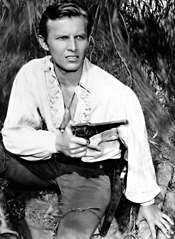
Merlin as a good guy in his series, Rough Riders (1958-1959)
|
That Japanese tragedy I mentioned before was also sent it off to various publishing houses with frustrating lack of success. During this low ebb in my life, the head writer of Another World, Harding Lemay, a playwright and buddy from New York days, had read my manuscript. He was kind enough to ask if I'd be interested in writing for the soap. I explained I didn't know anything about that show, and he suggested I watch the series for a number of weeks and he'd send me a test script to do. Although I lived on the West Coast, my trial script was accepted and I was taken on as one of his writing crew.
WRITING FOR SOAP OPERA
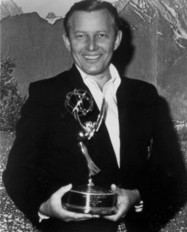
Jan Merlin accepting an Emmy for Another World |
Writing for a soap is a deceptively simple procedure. The head writer has prepared a "bible", which is the proposed plot for the entire season, with brief outlines of each week's daily episodes. The writers are each assigned their outlines and follow that particular episode's breakdown in conformance with what took place earlier and was to come in future episodes, but they can be creative with the characters involved and how they lead into the next episode. Actors have little to do with changing scripts or the length or content of their roles to suit themselves; the head writer is totally in charge. Difficult actors can sometimes be "killed off"... on camera, if necessary, to make certain they'd not be rehired. |
Soaps are a modern art form with a tried and true formula; the major subjects of every episode are the Commercials. So one writes short scenes and fits of passion and intrigue to fill in those intermediate moments. It's somewhat challenging, but you have the advantage of seeing and knowing what your actors do best. You write for them, and for the future outcome of the show without giving away what is to happen, other than dire hints in every episode's conclusion. Lostis a true soap opera... just as is Desperate Housewives... they are merely different for being on at night instead of during the day.
Another World was an educational five-year lesson for me; I learned a lot from Mr. Lemay about writing during that period. His guidance and criticism were invaluable; I owe him my perpetual thanks.
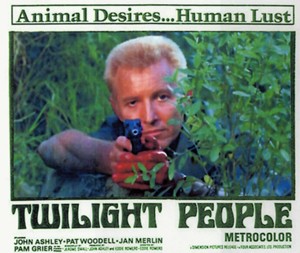
Jan Merlin in one of his film roles from the 70s.
JAN MERLIN'S BOOKS
I eventually wrote book after book, and obtained a New York literary agent for my manuscripts. After many rejections, I did a rewrite of my first manuscript into No Brocade For My Village, and it was published in 1982 as a romance novel by Avon Books under their shortened title: Brocade. One would think it would be uphill after that, but it wasn't. I got quite despondent over the constant rejections of my other manuscripts. None of them were romance novels... and neither had the first book been one. It was a grim story, based upon the short life of a Japanese-American boy. Having regained the rights to it, my revised book is now published by Xlibris, and retitled Ainoko, which was it's original working title when I began... that somewhat disdainful Japanese word means "the love child", a more polite translation for "the mixed blood bastard".
I can only tell you how I go about 'writing'. Everyone has their own method, their own style, and their own voice, and there's no magic course to guarantee you'll be successful. Just write, if you must.
THE WRITING PROCESS
An idea sparks, a phrase may trigger a possible plot, and I'll start with a blank page, typing the number 1 at the top right corner. Sometimes I just know what the final ending is to be, and other times the plot's already fully in mind. When I write about historical events and people, it's a task of making the period and its well-known characters vividly alive again. Once the very first sentence is before me, the rest follows until I run out of steam or must stop to brood about what comes next. Sometimes characters literally take the story away from what I thought it was going to be... and I may break into laughter or even get quite moved over lines just written.
I'm in the skin of every character of the manuscript and decades of acting help to flesh one out with emotion and ego. Research is always done thoroughly and is fascinating; maps and portraits line my workroom walls. My exposure to all walks of life and other countries adds to the process. Some books take three months or so to write; others much longer. It depends upon the subject matter... and upon how much and how often you rewrite. That's really where the craft exists... in the rewriting. I'm guilty of doing it no matter how often I read a page, even a published one. There's always another way to express a thought, another change to improve the work...
Truman Capote claimed nobody's safe from a writer... I find that to be true; everybody met is fair game. Combinations of acquaintances are used to form new characters; entire personalities and appearance suit others. A fictional amusing story about neighbors in the hills of Hollywood, "The High Priestess", was one of two stories I put into my book, Crackpots, which also contained another yarn, "The Bakla's Cross", concerning a mad film company and war treasures in the Philippines. I had a habit of taking the unfinished manuscript with me whenever I left the house, so I could jot notes on its pages if any ideas arose. I was in my carport overlooking the pool next door, and had placed the bundle of pages atop the car while I opened its door. A vagrant wind blew half the pages from the car onto the poolside below... and I had to race to clamber over a fence to retrieve them. I was terrified the indomitable lady of the house would suddenly appear and happen to glance at any one of my paragraphs. I had planned to give her hen-pecked spouse a happy ending, and she and her husband were identifiable beyond any doubt.
Only their names were changed...
| Or names may be altered artfully. As in Shooting Montezuna, in which I was writing a fiction about the painful experience I had when filming The List of Adrian Messenger. It was a year long thankless job being an actor secretly performing under masks of disguise used in the movie, sort of a moveable prop without credit while a name star was to take the bow for my work. I thought it would be great to work with John Huston, but he never saw me with my own face... only under one or another of the masks during the entire filming; he's named Hugh Johnston in my book. Fiction and scraps of truth are co-mingled throughout. There are other persons misnamed like that, but you'd have more fun reading the story and deciding who they are for yourselves.
Dipping into the past can be both nostalgic and a source for many stories. The Depression years could be revived with all the struggling folk encountered, sewing their individual lives together into a plot they had never lived. I did that with Gypsies Don't Lie. contrasting memories I had of Hooverville shacks on the 1930s East River waterfront with the later New York World's Fair of 1939... and showing how people dwelt on the Lower East Side and their contacts away from the city, while recalling boyhood's joy of New York's clattering elevated trains and the mournful loneliness of coal-engine trains hooting at night over sleeping farm communities. |
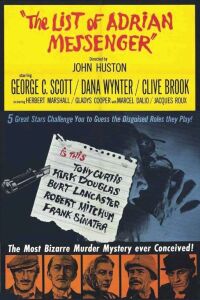
The List of Adrian Messenger
Guess who's under all those makeups? |
Dipping into history is perhaps the most intriguing to do. Writing about Africa was inevitable for me. During my several extended visits to that continent, I traveled through Central and East African areas, and circled the entire perimeter of Lake Victoria. The gist of a new way to depict how it was "discovered" kept nagging at me until I surrendered and began to write Gunbearer, which was the same tale the original explorers had published in their journals, with one difference... my pages are related by the actual native gunbearer who served them. What started as a single volume has turned into Gunbearer, Part One, and Gunbearer, Part Two... and I'm going to bring Sidi Mubarak Mumbai's life to a close with yet a third volume, in which he is involved with other explorers of later expeditions.
A reader may pick up a smatter of the languages in my books... and learns much that was hidden from the public by those old journals. Names given to the explorers by their safari were descriptive and accurate; however, the translation of them on my pages differs from those the explorers reported, just as events on the treks are equally seen in another light. I was lucky enough to observe the land and people there almost the same as they were in that Victorian time... I also saw the drastic change begin during the Mau Mau uprising in 1953. The Gunbearer books are an elegiac ode to a rapidly vanishing beautiful land.
Dr. William Russo of Curry College, Massachusetts, has written almost a dozen books dealing with film, sports, and the Civil War days, but the one which first brought us to any thought of collaboration was his treatment of an Audie Murphy film, The Quiet American. Because he knew I'd worked with Audie several times, he sent me his raw beginnings of a manuscript. I could not resist supplying him with my own personal knowledge about the Asian Pacific areas and some of the actors in the film, and was able to put him in touch with Willard Willingham, Audie's best friend, stuntman, and stand-in. William Russo's book, A Thinker's Damn, turned into a gem of a report on the making of a film overseas, with its problems, frustrations, and scandals revealed through interviews with executives and agents and film personnel still available to share their memories. And we had discovered we could work together quite well, each of us benefiting from one another's expertise. It has led to some more film books.
The Paid Companion of John Wilkes Booth is another version of history, this one co-authored with Dr. Russo. He'd done much research on the Lincoln assassination, and wanted to make use of his massive collection of material about Doctor Mudd. Assuming everyone already knew so much about the event, I suggested we take a different tack and base it upon one of the lesser known participants. Intrigued with the idea, he agreed and we made our protagonist one of the conspirators hung for being involved, the young Rebel soldier known as Payne. We then proceeded to exchange chapter after chapter, continually running across fresh information to include about him. Payne came alive and took over our work, making it easier to do.
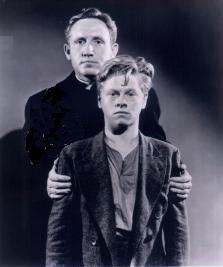
Boy's Town
Frankie Thomas played the "Mayor" of Boys' Town,
Spencer Tracy and Mickey Rooney were the stars |
All this had to be accomplished via e-mails since I live in the West and Dr. Russo in the East. Yet, because Dr. Russo specializes in books about films, and requires time spent at the Beverly Hills film industry's library, my wife, Barbara and I get to see him whenever he spends his summer vacations out here. We try to fatten him up with our dinners and then send him back East to hibernate for the winter. I've been able to do two more books with him: Trouble in a Golden Eye, about the failed John Huston movie starring Elizabeth Taylor, Marlon Brando, Brian Keith, and Julie Harris. That film, Reflections in a Golden Eye, was based upon Carson McCuller's acclaimed novel... but there was more oddity in the production of it than what ended up on the screen.
Our latest co-authored book is MGM Makes Boys' Town. Spencer Tracy earned his second Oscar for his performance, though it was Mickey Rooney who stole the film. We were fortunate to get interviews with many who were involved. I'm pleased Dr. Russo is able to refer proudly to our books in his classes for students of film and theater. He's already buzzing with ideas for the next collaboration... |
View external sites with more information about Jan Merlin:
Return to:
|

